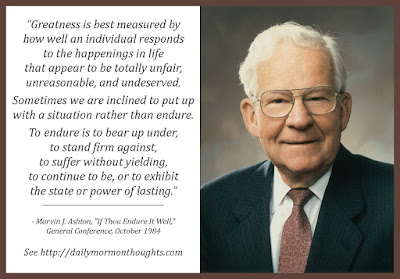"Each of us is a runner in the race of life. Comforting is the fact that there are many runners. Reassuring is the knowledge that our eternal Scorekeeper is understanding. Challenging is the truth that each must run. But you and I do not run alone. That vast audience of family, friends, and leaders will cheer our courage, will applaud our determination as we rise from our stumblings and pursue our goal. The race of life is not for sprinters running on a level track. The course is marked by pitfalls and checkered with obstacles. We take confidence from the hymn:
"'Fear not, I am with thee; oh, be not dismayed,
'For I am thy God and will still give thee aid.
'I'll strengthen thee, help thee, and cause thee to stand,
'Upheld by my righteous, ... omnipotent hand. ...
"'The soul that on Jesus hath leaned for repose
'I will not, I cannot, desert to his foes;
'That soul, though all hell should endeavor to shake,
'I'll never, no never, ... no never forsake!'
(Hymns, 1985, no. 85).
"Let us shed any thought of failure. Let us discard any habit that may hinder. Let us seek; let us obtain the prize prepared for all, even exaltation in the celestial kingdom of God."
- Thomas S. Monson, "The Will Within," Ensign, May 1987, p. 67
Click here to read the full talk
President Monson is the consummate cheerleader. He is always encouraging, always offering vision and aid in his messages. This is a great example. He reminds us that while we all have to run the race of life, we don't have to run alone. We have friends, family, leaders, and the Savior to aid and sustain us in the journey.
The final statement is a prime example of President Monson's personal enthusiasm for life:
"Let us shed any thought of failure. Let us discard any habit that may hinder. Let us seek; let us obtain the prize prepared for all, even exaltation in the celestial kingdom of God."President Monson completed his probation. He invites us to continue faithful in ours!
(Compilation and commentary by David Kenison, Orem, Utah, 2022)
August 21, 2015
August 21, 2015

































